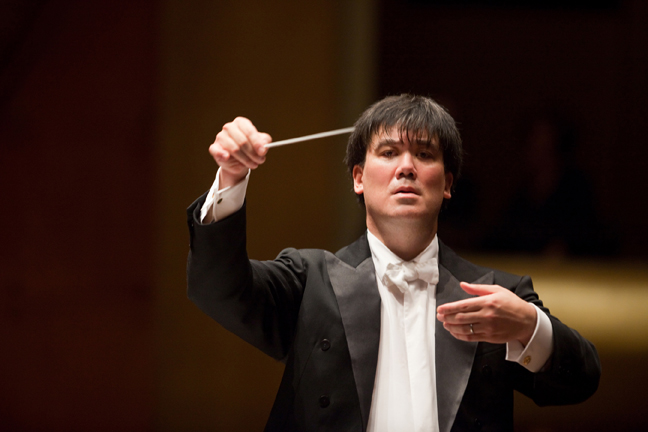Gilbert, BSO make edgy, bright-hued music together

Alan Gilbert conducted the Boston Symphony Orchestra Thursday night in music of Ravel, Stravinsky, Dutilleux and Tchaikovsky. File photo: Chris Lee
The Boston Symphony Orchestra really took a shine to guest conductor Alan Gilbert Thursday night.
For the BSO’s first program of 2013, featuring French or French-influenced works of the mid-20th century, Gilbert asked for and got the brightest tone colors on the orchestra’s palette—sometimes mixed to perfection, sometimes unduly harsh—and punched them out with compelling rhythms.
Métaboles by Henri Dutilleux, composed in 1964, especially benefited from this treatment. Based on minimalist harmonies around the note E, the piece derived its main interest from the vivid colors Dutilleux sparingly selected from his large orchestra. The five short movements, played continuously, took simple thematic materials by turns through piquant winds, velvety brass, and lush strings. Gilbert drove it all forward with complex, precisely rendered rhythms.
Playing the penultimate slow movement, titled “Torpide,” the attentive BSO players appeared anything but torpid themselves, and the closing movement (“Flamboyant”), in which Dutilleux at last stirs the orchestra’s sections together, was a model of disciplined frenzy—call it “Son of La Valse.”
Appropriately, Ravel’s 1921 orchestral showpiece bookended this concert at the close. With its infectious lilting rhythms, La Valse is commonly thought of as a piece that is sensuous and seductive most of the way, then turns violent at the end. On Thursday night, the violence began early, right after the theme emerged from the pulsing miasma of the opening bars, as Gilbert drove the music to a splattering fortissimo climax.
Thereafter, the emphasis was on the satirical rather than the sensual. Waltz rhythm and rubato were duly observed, but in a context that sounded driven and hard-edged. And there seems to be a trend lately for conductors to call for rude noises from the brass, in repertoire ranging from Beethoven to Shostakovich. One half-expected the tuba player to excuse himself after some of the notes he emitted on Thursday.
Gilbert, music director of the New York Philharmonic, also brought an edgy New York state of mind to the piece that preceded La Valse, Stravinsky’s Symphony in Three Movements. Composed in 1942-45, during Stravinsky’s California sojourn and flirtation with Hollywood, the piece has a somewhat cinematic quality (although the composer’s program note, claiming inspiration by newsreels of Chinese peasants and goose-stepping soldiers, is almost certainly a leg-pull), but there was nothing lush or laid-back about Gilbert’s taut performance.
Instead, the smoothly polished sections of the orchestra slid together like a well-regulated machine, albeit a syncopated one, enlivened by Vytas Baksys’s jazz accents on piano and the cool harp tone of Jessica Zhou in the slow movement. Gilbert deftly mixed moods in the finale, its blatant march alternating with a soft string interlude, and the orchestra’s tight ensemble in the complex, stammering coda was breathtaking.
Amid all this modernity, Tchaikovsky’s Violin Concerto was apparently intended to provide a Romantic getaway. Actually, this composer’s music can benefit from a dose of the clarity and discipline heard elsewhere on Thursday’s program, but it didn’t get it on this occasion. Instead, the orchestra seemed to fall apart, playing chronically late and often not even together, as if it was sulking at the subordinate role the composer had assigned it in this piece.
With no support behind him, soloist Julian Rachlin—making an eleventh-hour BSO debut substituting for Lisa Batiashvili, who was reportedly recovering from a back injury—had to carry the whole performance himself, while dealing with audible debut jitters in his bow. Not much of this piece’s much-loved lyricism and humor came through.
Under the circumstances, however, Rachlin managed well with his part’s stupefying technical demands. And he had the audience pulling for him–when he turned on the jets and brought the first movement to an exciting close, they threw concert decorum out the window and applauded long and hard.
The program will be repeated Friday at 1:30 p.m. and 8 p.m. Saturday and Tuesday. bso,org; 617-266-1200.
Posted in Performances



